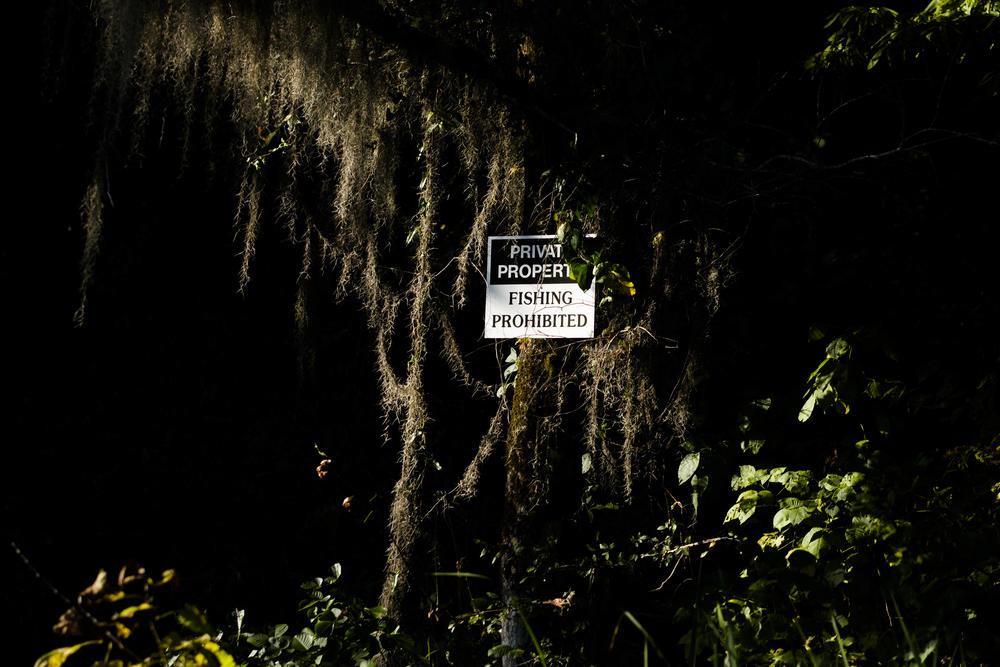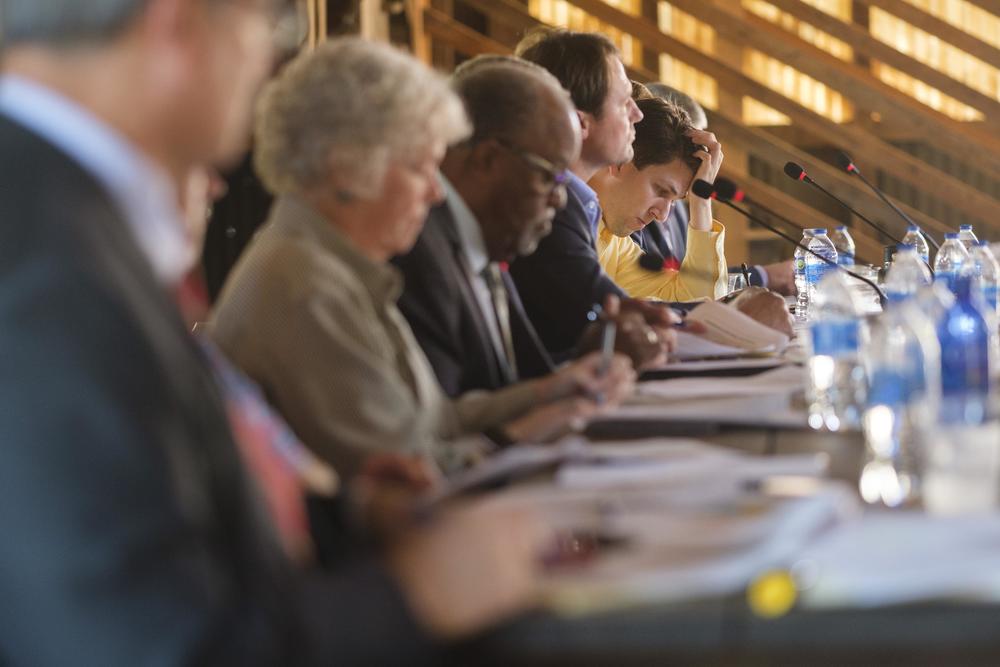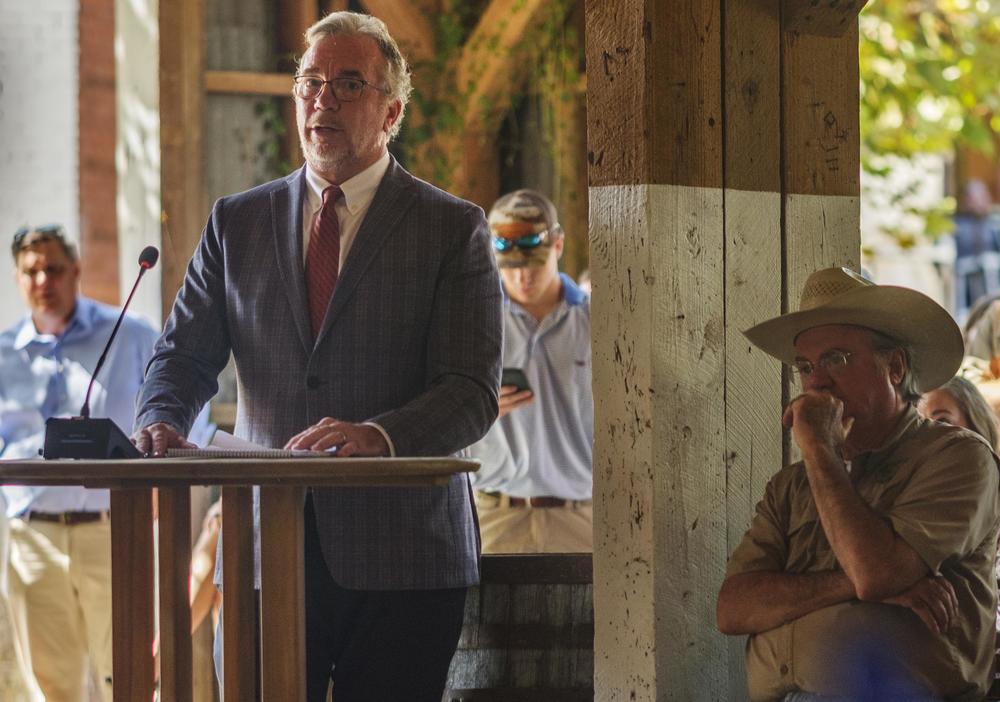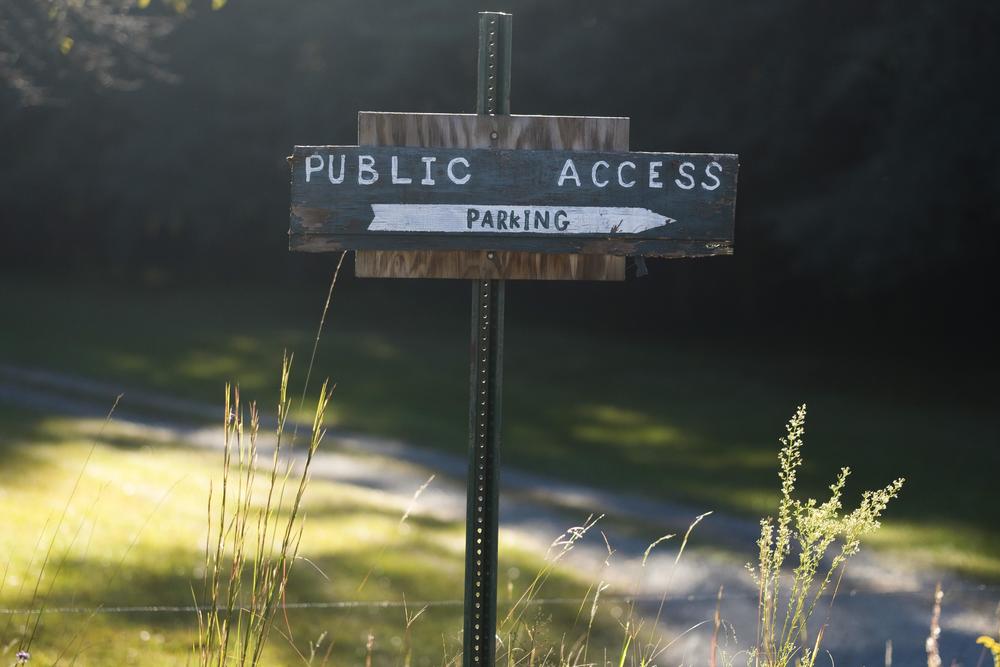
Caption
A sign warns anglers away from section of the Flint River south of Thomaston, Ga.
Credit: Grant Blankenship / GPB News
The downhill horizon of a yardslong, low-speed waterfall on the Flint River curled out of sight through a rocky jumble when Allen Ragsdale told his passengers to pay attention.
“We’re definitely gonna pinball off some rocks through here, so stay centered up,” Ragsdale said.
Ragsdale is a longtime fishing guide on the Flint River in western Georgia. By this point he had safely rowed from the public boat ramp a mile upstream, through the rock slabs of Yellow Jacket Shoals and into the heart of a running argument.
“Everything down on this side you're free to fish and swim,” he said, gesturing to apart of the river on one side of an imaginary line running along the streambed. On the other side of that line was private property.
“You’d have to have a GPS and look on a map to know where it splits between there.”
The “No Fishing” signs were the only hint.

A sign warns anglers away from section of the Flint River south of Thomaston, Ga.
The fishing signs were part of a long-running local dispute over who could use this picturesque stretch of the Flint River, a dispute which inspired a state law in 2023's legislative session meant to ensure the public’s access to the same waterways.
As it turns out, that law may have only further muddied the water.
Allen Ragsdale said it was in the mid-2000s when a Department of Natural Resources enforcement officer showed up at his house.
“He told me I could not finish a certain section of river,” Ragsdale said. "And when I asked if I could float through there to access river below there, I was told I couldn't do that, either."
It was a place he’d been fishing since he was a kid growing up on this same river.
"I was told I'd be locked up for criminal trespass if I was seen in there again.”
Others had seen their own conflicts. Yellow Jacket Shoals landowner Samuel Brewton III fired a gun at a family of kayakers. He’s serving a decade in prison.
Later, his brother, attorney Ben Brewton, took a different tack, and sued.
He got what he wanted: a settlement from the state saying since he owns land adjacent to the Flint River, he owns rights to the piece of the river flowing by his land, too. About a year later, members of the Georgia House are still talking about that.

Georgia House member Brock Perry looks over the history of Georgia river access compiled by the Southern Environmental Law Center during the first public hearing of the Georgia House Committee on Fishing and Freshwater Resources on river access in the town of Gay, Ga.
The Georgia House Committee on Fishing and Freshwater Resources convened to figure out how to enforce the law that passed after Ben Brewton got his way.
Landowners, river people, denizens of the Gold Dome and local politicians gathered in an old barn at a Meriwether County microbrewery in early fall for the committee's first meeting.
There the attendees took up the implications of Senate Bill 115, signed into law by Gov. Brian Kemp this spring after passing out of the Legislature as the clock nearly timed out for the session.
SB 115 was meant to make Brewton’s settlement a one-time thing, by reiterating that the state owns the riverbed under navigable rivers.
But there was a hitch: SB 115 did not define navigable.
That’s the job of the house committee, which heard a few definitions in that first meeting.
First, the federal definition: If in its natural state a river was likely used by people for trade and commerce in 1788 when Georgia became a state, it’s navigable today.
But in her presentation to legislators, Southern Environmental Law Center attorney April Lipscomb said there are wrinkles in the federal rule.

Southern Environmental Law Center Attorney April Lipscomb leads members of the public and Georgia House members through the history of public access to rivers and fishing in Georgia during the first public meeting of the House's committee on the topic in the town of Gay, Ga.
“The United States Supreme Court said ‘We don't look at the water body as a whole. We actually look at it on a segment by segment basis,’” Lipscomb said. That could create the need for untold numbers of official determinations along even a single river.
Plus, said Lipscomb, how is a boater to know they have floated between navigable and un-navigable sections of river?
"You know, I think it's really hard for an average person to get out on a river and figure out if that segment of the river was susceptible of being used for trade or travel using whatever watercraft was used it back in 1788," she said.
What’s more, Georgia has its own 19th-century definition with a far narrower scope, based in part on how well a river moves loads of freight.
Scott Robinson is head of fisheries for the Georgia DNR. He told lawmakers to know what DNR calls navigable, look where DNR maintains boat ramps like the one Allen Ragsdale used to float to Yellow Jacket Shoals.
"We do consider downstream of there to be open to public use, Robinson said. “Otherwise it wouldn’t be appropriate for us to put a boat out there.”

Landowner Ben Brewton inspired the eventual passage of Georgia Senate Bill 115 which protects public access to fishing on "navigable" waters when he sued the state, asserting he owned rights to the water adjacent to his Flint River property.
Lipscomb said this muddle leaves the situation primed for more lawsuits, which could mean fighting over access in court one river at a time.
And as more Georgia greenspace is bought and sold, Lipscomb said those suits could imperil any of our chances to float someplace wild.
“Public access is important for more than just fishing,” Lipscomb said. “There are people who boat, there are people who swim. There are people who just like to get on the water and enjoy that space."

A sign points the way to the public boat ramp on the Flint River about mile north of Yellow Jacket Shoals in Upson, Ga..
There’s a sense in which Ben Brewton, whose lawsuit kicked off the whole dispute, and Lipscomb apparently agree.
“This is a slippery slope that we're on," Brewton said. “And people need to recognize that today it's a fish. Tomorrow it's going to be something else.”
The Georgia House Committee on Fishing and Freshwater Resources wraps up its statewide listening tour in December.